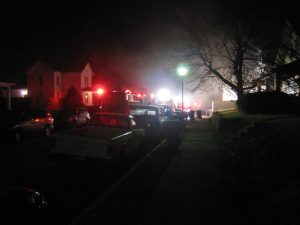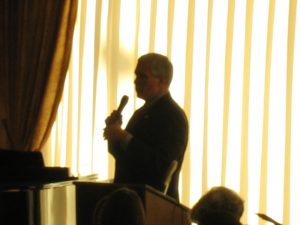Over at ProgressiveWayneCounty.org, I just posted the list of alternative transportation goals for Richmond, Indiana that I came up with in March as a part of my work on the committees that are implementing Richmond's Comprehensive Plan. Comments and feedback welcome (there or here).
Tag: government
 It's interesting to me that the phrase "for national security reasons," offered by the U.S. government and governments around the world to justify various uncomfortable activities (withholding information from or spying on its citizens, demanding cooperation from corporations in legal gray areas, etc.) is so commonly used and so consistently effective. It's effectiveness is based on an apparently safe assumption that the American people largely subscribe to at least one of two world-views: 1) The needs of the many outweigh the needs of the few, and 2) the government knows what's best for us as individual citizens better than we do ourselves.
It's interesting to me that the phrase "for national security reasons," offered by the U.S. government and governments around the world to justify various uncomfortable activities (withholding information from or spying on its citizens, demanding cooperation from corporations in legal gray areas, etc.) is so commonly used and so consistently effective. It's effectiveness is based on an apparently safe assumption that the American people largely subscribe to at least one of two world-views: 1) The needs of the many outweigh the needs of the few, and 2) the government knows what's best for us as individual citizens better than we do ourselves.
How do these world-views work in the government's favor?
I was glad to see today's article about the Indiana Association of Cities and Towns` "If I Were Mayor, I Would..." contest (PDF link on that last one). Such things can only improve the quality of dialogue about what we want for our communities. Local elementary school student Ross Mathews took the prize in the statewide contest for his essay; his plan focused on a few key areas: 1) making sure children in Richmond had better funding for school books and educational field trips, 2) adding more staple businesses to the West side of Richmond to save gas for those living there, 3) decreasing poverty through charitable giving events, and 4) keep Richmond clean so it looks nicer. Hats off to Ross for thinking beyond his years and looking selflessly at the big picture. If only mayoral elections took place on the true merits of such plans alone.
I haven't yet received my entry form for the "If I Were Mayor" essay contest to be held amongst myself and other local adult citizens, but in the greatest tradition of blogging, I shall now commence to ramble on regarding something about which no one has asked me:
Continue reading "If I Were Mayor"
 In my eighth grade English class, Mr. Sweeney asked us to write a persuasive essay and then deliver it to the rest of the class convincingly. The United States had just sent its military to the Middle East to expel the Iraqi forces that had invaded Kuwait, and that was a hot topic of discussion and controversy. As a part of these events, the head pastor at my church had recently delivered a sermon on what constitutes a "just war." It was a good sermon - contemplative, balanced, and challenging without being preachy (beyond the normal degree to which a white man adorned in robes standing in an ornate pulpit speaking down to a congregation with an amplified and booming voice is "preachy"). Because I admired this man and trusted my church and had not yet at that point in my life encountered any other theories of war, I found myself thoroughly convinced that the use of force by my government in that case was justified. I thought it was a perfect topic to use for my own persuasive speech.
In my eighth grade English class, Mr. Sweeney asked us to write a persuasive essay and then deliver it to the rest of the class convincingly. The United States had just sent its military to the Middle East to expel the Iraqi forces that had invaded Kuwait, and that was a hot topic of discussion and controversy. As a part of these events, the head pastor at my church had recently delivered a sermon on what constitutes a "just war." It was a good sermon - contemplative, balanced, and challenging without being preachy (beyond the normal degree to which a white man adorned in robes standing in an ornate pulpit speaking down to a congregation with an amplified and booming voice is "preachy"). Because I admired this man and trusted my church and had not yet at that point in my life encountered any other theories of war, I found myself thoroughly convinced that the use of force by my government in that case was justified. I thought it was a perfect topic to use for my own persuasive speech.
Continue reading "Justifying war, values training for war makers"
 Tonight's meeting of the City of Richmond Plan Commission was an interesting peek into the world of how urban planning in towns like Richmond takes place. It was apparently one of the only times for citizens to comment on the plan in its final form, though of course the whole process of developing the plan has involved public input all along.
Tonight's meeting of the City of Richmond Plan Commission was an interesting peek into the world of how urban planning in towns like Richmond takes place. It was apparently one of the only times for citizens to comment on the plan in its final form, though of course the whole process of developing the plan has involved public input all along.
Continue reading "Approving Richmond's comprehensive plan"
 The "Town Hall meeting" with Congressman Mike Pence this morning at the Leland Residence was fairly well attended (compared to similar such events, not as a function of the district's population) and interesting, I thought. Pence talked about his recent decision not to join the congressional leadership so that he could continue to pursue his ideals and issues (limited government, strong defense, "traditional moral values," etc.), about his two major concerns for the year (deficit reduction and border security) and the "War on Terror." The questions covered giving greater access to passports, whether every child in the country has the right to have healthcare, health insurance costs for small business and how we could change our culture and insurance system, energy concerns and drilling in the Alaska National Wildlife Refuge, whether being born in the U.S. should give you automatic citizenship, concerns over the abuse of executive privilege related to wiretaps and torture, the federal outlook on highway I-69, and others. As in the past, I appreciated Mr. Pence's time speaking with his constituents, and I admired greatly those who had the initiative to speak and question him. All of my photos from the meeting are here.
The "Town Hall meeting" with Congressman Mike Pence this morning at the Leland Residence was fairly well attended (compared to similar such events, not as a function of the district's population) and interesting, I thought. Pence talked about his recent decision not to join the congressional leadership so that he could continue to pursue his ideals and issues (limited government, strong defense, "traditional moral values," etc.), about his two major concerns for the year (deficit reduction and border security) and the "War on Terror." The questions covered giving greater access to passports, whether every child in the country has the right to have healthcare, health insurance costs for small business and how we could change our culture and insurance system, energy concerns and drilling in the Alaska National Wildlife Refuge, whether being born in the U.S. should give you automatic citizenship, concerns over the abuse of executive privilege related to wiretaps and torture, the federal outlook on highway I-69, and others. As in the past, I appreciated Mr. Pence's time speaking with his constituents, and I admired greatly those who had the initiative to speak and question him. All of my photos from the meeting are here.
Wednesday night I attended a screening of The Ambassador, a documentary about John Dimitri Negroponte, currently the U.S. Director of National Intelligence and formerly U.S. ambassador to Honduras, the United Nations and Iraq. Negroponte has been a controversial figure due to his involvement in the Iran-Contra Affair and human rights violations in Honduras, and the film took on those controversies by documenting Negroponte's career as a diplomat, his public and private statements about the accusations made against him, and the forces that influenced his path all along.
Continue reading "The Ambassador"
In an editorial today, the Palladium-Item called for Richmond and Wayne County to embrace job growth in the retail and service sectors, as opposed to the manufacturing sector. I generally support their call for an intentional focus on facilitating the kinds of economic growth that Richmond needs, and I was pleasantly surprised to find that they address the difference between the immediate concerns of the unemployed ("if you are without work...there is little reason to scoff at any kind of paying job") and the obligations of those working on economic development to focus on a longer-term vision ("a carefully crafted plan for attracting select retail and services businesses can build upon important quality of life factors locally"). This is a distinction often passed over in our community and many others; the most prevalent calls are usually for bringing in any jobs at all, no matter what the benefits and long-term impact on the community.
Continue reading "Search for more jobs requires driving vision"
I generally avoid national bestselling political books that are just consolidated accounts of the political soap operas that go on in our nation's capital, designed to make more buzz and more money for the journalists or whistle-blowers or former aides that happened to keep really good notes during the experience. But once in a while there are some pretty compelling publications that appear in that genre, and I can't help but dive in. Bob Woodward's Plan of Attack certainly emerges as an example of a page-turner for anyone interested in national politics, the executive branch's decision making process, and especially how the U.S. ended up invading Iraq.
Continue reading "Plan of Attack by Bob Woodward"
It looks like the War on Terror is over. That is, it's now become a Global Struggle Against Violent Extremism, according to the Bush administration's shift in language being used to describe that particular set of economic, military, domestic law enforcement, and foreign policy initiatives. I suppose we've come along way from the national security policy known as "Smoke 'Em Out" or "Bring 'Em On", but this new phrasing doesn't really warm the heart either. As someone who has come to appreciate the value of framing - and how good the current administration has been at it in the political sense - I'd like to suggest a few bits of analysis of what this new frame means.
Continue reading "The War on Terror is Over"
